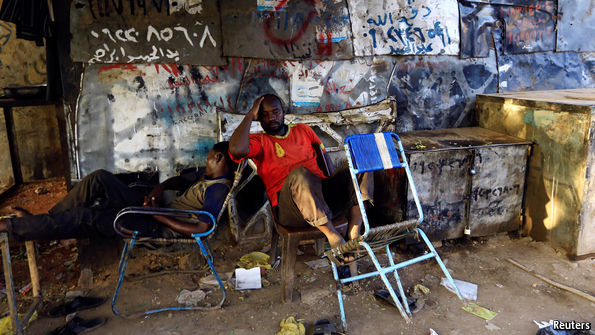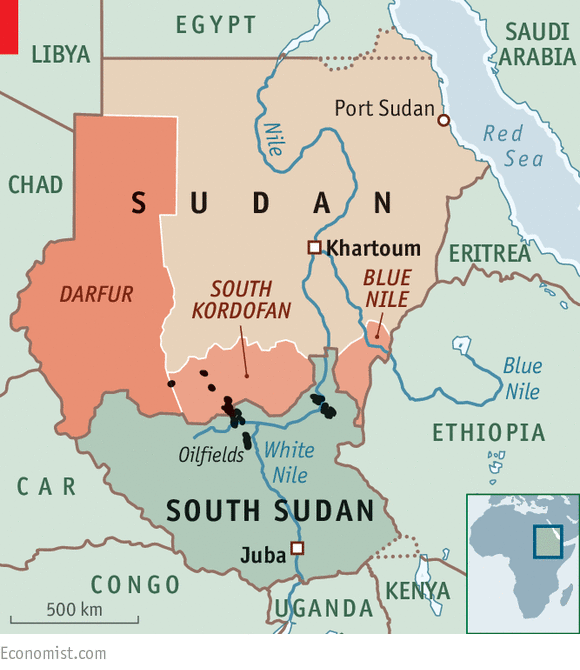|
|
 Re: Ш§Щ„Ш§ЩҠЩғЩҲЩҶЩҲЩ…ШіШӘ : ШӘШҜЩҮЩҲШұ Ш§ШӯШӘЩҠШ§Ш·ЩҠ Ш§Щ„ЩҶЩӮШҜ Ш§Щ„ШЈШ¬ЩҶШЁЩҠ (Re: Yasir Elsharif) Re: Ш§Щ„Ш§ЩҠЩғЩҲЩҶЩҲЩ…ШіШӘ : ШӘШҜЩҮЩҲШұ Ш§ШӯШӘЩҠШ§Ш·ЩҠ Ш§Щ„ЩҶЩӮШҜ Ш§Щ„ШЈШ¬ЩҶШЁЩҠ (Re: Yasir Elsharif)
|
Tribulations, but no trial
Sudan, a rump state run by an alleged war criminal
Omar al-Bashir is taking his country nowhere
Dec 3rd 2016 | KHARTOUM

DR MUNA ABDU, an ophthalmologist, is worried. вҖңI am afraid of leaving my country for a long time,вҖқ she says, her back to the Blue Nile, dark but for the lights of a few riverside restaurants as it flows towards its embrace with the White Nile in Khartoum. But she still plans to move to Saudi Arabia, where she will earn $6,000 a monthвҖ”a sum that would take her three years to make in Sudan.
On some measures SudanвҖҷs economy is recovering, after the southern part of the country broke away to form South Sudan in 2011, taking with it 75% of the old nationвҖҷs oil revenues. GDP has grown at around 3% a year since 2013. Inflation is in double digits, but well below its level in 2012-14, when it averaged almost 40%. However, on the black market the Sudanese pound trades at only a third of its official value against the dollar. There are just $800m of foreign exchange reserves left in the central bank, according to the IMFвҖ”enough to cover only a month of imports.
Businessmen are quick to blame American sanctions. These have been in place since 1997 (Khartoum harboured terrorists including Osama bin Laden in the mid-1990s) and were extended in 2007 because of the genocide in Darfur. But it is only in the past few years that international banks have started refusing to deal with Sudan, after America cracked down on sanctions-busters. One former chief executive tells of a $10m debt repayment for his company having to be made with a suitcase of cash.
Nervous banks have not, however, made trading with Sudan impossible. Artisanal gold mining is booming and the country exports plenty of livestock to the Gulf. But these do not make up for the lost oil revenues. Meanwhile, sanctions mean Sudan is mostly ineligible for relief on its $48.2bn debt, 86% of which was in arrears at the end of 2015. One boost has come since September 2014, when Sudan expelled a number of Iranian diplomats and cosied up to Saudi Arabia. It has sent hundreds of soldiers to fight alongside the Saudis and against Iranian-backed Houthi rebels in Yemen. Since then, at least $2.1bn has been deposited in its central bank by Saudi Arabia and other friendly states. However, billions of dollars of Saudi investment and military aid that were reportedly promised have not materialised.
Nonetheless, the switch into the SaudisвҖҷ orbit suggests that the Sudanese government wants to shed its pariah status. It is also co-operating with the EU to reduce illegal migration into Europe, cracking down on people-trafficking and improving its border security.
But the sanctions were renewed again on October 31st and still have strong bipartisan support in AmericaвҖҷs Congress. Walid Phares, an adviser to Donald Trump on the Middle East, says they should remain. AmericaвҖҷs position is unlikely to change given the record of SudanвҖҷs Arab-dominated Islamist government of slaughtering black African Muslims in Darfur, and Christians and animists in the south of the country (although most of these have now seceded). For nine months this year government forces attacked the Jebel Marra, a massif in central Darfur where the Sudan Liberation Army-Abdel Wahid (SLA-AW) are holed up. As many as 205,000 locals fled their homes; there are now perhaps 2.6m displaced people in Darfur, a region the size of Spain. Amnesty International claims to have evidence that the government used chemical weapons. It denies this, but restricts access to the area.

The SLA-AW, whose eponymous leader directs proceedings from Paris, has been reduced to harrying the Sudanese army. The other two main rebel groups, the Justice and Equality Movement (JEM) and SLA-Minni Minnawi, are in peace talks with the government. This is a sign of weakness, says Magnus Taylor of the International Crisis Group, a Brussels-based think-tank. The government seems to think it is close to victory after 13 years. But elsewhere in Darfur violence flares sporadically, particularly between Arab groups that used to be part of the Janjaweed, a state-sponsored horseback militia responsible for much of the killing and raping during the genocide. вҖңThere are weapons everywhere and a limited capacity or willingness to do anything about it,вҖқ says Mr Taylor.
Meanwhile, negotiations with the Sudan PeopleвҖҷs Liberation Movement-North (SPLM-N), previously part of the South Sudanese rebel movement and now fighting in the border states of South Kordofan and Blue Nile, have broken down. Although Omar al-Bashir, SudanвҖҷs president, has extended the traditional rainy-season ceasefire, neither side is budging.
Back in Khartoum, the president was forced to start a вҖңNational DialogueвҖқ after 170 people were killed in protests over fuel-subsidy cuts in September 2013. But the talks, which concluded in October, were largely cosmetic and left the powerful security forces under Mr BashirвҖҷs thumb. Sudan Call, a coalition of political parties and rebels that refused to join in, has failed to create a coherent opposition. Demonstrations against more cuts to subsidies in November have so far been suppressed.
So when middle-class Khartoumites gather to drink sugary coffee and sweet tea beside the Nile at night, they talk, not of replacing the president, but of leaving Sudan, like Dr Abdu. The remittances of the hundreds of thousands who have gone before them keep the economy alive. Meanwhile, Mr Bashir, whose arrest on charges of orchestrating the genocide was ordered by the International Criminal Court in 2009, looks unlikely to step down, let alone stand trial.
This article appeared in the Middle East and Africa section of the print edition under the headline Tribulations, but no trial
| |
  
|
|
|
|